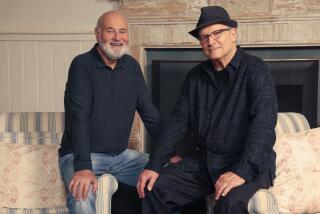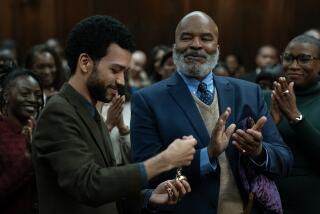Spellbinding look at self-help guru Tony Robbins. Lifeline or snake-oil salesman? You decide
- Share via
Reporting from Austin, Texas — He had directed some of the most acclaimed documentaries of the contemporary era, but Joe Berlinger was just a regular guy grappling with personal issues when he decided to attend a Tony Robbins seminar in 2012.
Robbins had reached out to Berlinger after seeing the filmmaker’s Metallica documentary “Some Kind of Monster” a number of years before, and the two had formed a friendship. The self-help guru invited Berlinger, an admitted skeptic about the brand of personal improvement Robbins practiced, to attend his week-long “Date With Destiny” event.
What resulted was a journey that changed Berlinger’s life. And given how he resolved to make a movie about Robbins, it might change your life too — or, OK, at least set percolating a series of questions about the nature of charismatic leadership and the ways we approach and measure the benefits of psychological counseling.
“This movie is not meant to defend or promote Tony Robbins’ methods, nor is it a compare-and-contrast to other modalities,” Berlinger said in an interview at a SXSW hotel Friday, ahead of the world premiere of his movie “Tony Robbins: I Am Not Your Guru” at the festival Monday night. “I just wanted to give most people an experience they wouldn’t have. It’s a concert film — the concert of human emotion.”
Instead of an exposé that fits with, say, Berlinger’s search-under-every-rock criminal-injustice tale “Paradise Lost,” about the so-called West Memphis 3, “Tony Robbins,” which has been acquired by Netflix, is a piece far more immediate and non-conclusive. It is also frequently spellbinding.
I just wanted to give most people an experience they wouldn’t have. It’s a concert film -- the concert of human emotion.
— Joe Berlinger
Robbins has built an empire on a foundation of confidence as broad as his shoulders. Hundreds of thousands of ordinary people have turned to Robbins, as have the likes of Hugh Jackman and Serena Williams, transforming him into a major celebrity in his own right.
But most are unfamiliar with how Robbins has developed such a following — the mechanics, essentially, of the seminars that have converted so many nonbelievers. Berlinger is here to shine a light, giving viewers entree to a world typically seen mostly through books, infomercials and other TV appearances. (The Times was shown a cut of the film ahead of the festival.)
At the heart of Robbins’ empire are his “Date With Destiny” seminars — nearly $5,000 a pop, 2,500 people attending — previously in Palm Springs but currently taking place near his home in South Florida. Over the film’s nearly two-hour run, viewers are taken through Robbins’ flagship event (he has done more than 70) as any participant would. There are the pre- and post-session workshops. There are the slick production values — music cued up for when an attendee Robbins has approached to engage in dialogue has enjoyed a breakthrough — in the large hotel space where the seminar takes place.
And, of course, there is the guru himself, occupying a role that, depending on your point of view, is either that of persuasive lifeline or snake-oil salesman.
“Our entire lives change in a moment,” Robbins tells attendees at one point. “And we’re going to have a lot of those moments.”
Either way, viewers have rarely seen anything like what’s inside that ballroom. “Date With Destiny” is one part tent-revival, one part talk-show confessional, one-part WWE-esque performance spectacle, and one part mass-group therapy.
The seminar moments play out with a kind of moral intricacy. When Robbins reaches out to a man who is contemplating suicide or a woman who is struggling with a relationship, there are questions, there is advice and, sometimes, there are demands. After a set of probing questions, the woman is ordered to call her boyfriend — a good guy she’s just not sure she loves — and break up with him in front of thousands of people, in one of the film’s more eyebrow-raising moments.
One of the few attendees who leaves Robbins (momentarily) silent is a Brazilian-born 26-year-old named Dawn who has been sexually abused for much of her life. Robbins can do little but give her a long hug and call her “a miracle.”
Soon, however, he has snapped into action, and offers her counsel as well as setting up a course of treatment with a group of experts over the coming months. As often happens after a Robbins intervention, there are reassurances, solicited by Robbins and dutifully provided by the recipient, that he has changed their lives.
The movie also features a number of backstage and home-prep moments. They include Robbins’ love of a mini-trampoline for a psych-up exercise — not outside a Mary Lou Retton highlight video have springy acrobatics played such a notable role in a public figure’s routine — and a planning team that includes staffers with titles such as “creative content specialist” and “lead master trainer.”
Watching “Guru,” one is likely to find themselves wondering about the nature of Robbins’ approach. He possesses a hard-to-deny eagerness to help and a tireless work ethic. He also forges a manifest connection with the people who seek him out. (That connection ripples through the thousands in the room, who put their hands up at Robbins’ request and often hug their neighbors; this is in a way a film as much about the unquenched needs of a striving public as it is about its title character.)
But there is also a quicksilver nature to Robbins’ diagnosis that can seem superficial, or worse. Real diagnosis, a trained psychologist might say, requires years of therapy, not some poke-around questions in front of thousands of people over light and music cues.
And Robbins’ advice can smack of the kind of squishiness that demonstrates why he’s become such a polarizing figure in the first place. Though his basic approach of attacking the source rather than the symptoms of unhappiness seems sound, he is often prone to making substance-agnostic such comments as “I want to provoke people back into the reality of this moment” and “Everybody needs something to move toward — if you don’t have something to move toward you settle for where you are.”
Berlinger had to persuade a reluctant Robbins to give him access; the self-help figure was initially hesitant about a film because he didn’t think a few hours on-screen can capture the full seminar experience. But he was persuaded by Berlinger that it could come close.
Reached by phone Sunday before he traveled to the festival, Robbins said he was satisfied with the result, which he watched for the first time after it was completed recently.
“My hope is that people will see the movie and have experiences that will open them up and appreciate others and appreciate themselves,” he said. ”My goal is to show problems that seem unsolvable can be solved, and I think what you see in the movie is how that’s possible.”
He added that he wasn’t seeking to persuade naysayers.
“If people get more of a sense of who I am, that’s good. But people see what they want to see,” he noted. “You can’t change critics’ minds. I bet 99% of the people who say critical things have never been to a seminar. This is for people who do have their minds open.”
Whether one indeed emerges with more sympathy for the work Robbins does or with criticisms about whether a man with little formal training should hold sway over so many people is the mystery at the center of the film. Are his tactics really the best approach to getting people back on their feet, one might wonder? Then again, who’s to say what “best” even means. If people feel helped, isn’t that the only metric that matters?
Berlinger’s film is as intent on posing questions — are you worried you’ll be wrong, he asks Robbins at one point — as it is on not offering answers.
In person, though, the director leaves little doubt about his conclusions.
“Tony’s philosophy is not for everyone, the way Catholicism is not for everyone and Transcendental Meditation is not for everyone,” Berlinger said. “But he is giving you the tools that you can then take and use to give yourself more control, that you can use to go on your own journey.”
The film is a decided shift for Berlinger, 54, who several years ago made the corrupt-system exploration “Whitey: The United States of America v. James J. Bulger.” The director said he has not abandoned stories of societal blights — he is working on a new film about genocide -- but felt the need to change gears here.
He said that he was moved to that decision by the simple fact that Robbins helped him with a number of “breakthroughs” on personal issues (he declined to offer specifics on what they were) and wanted to share his discovery. If someone with his own blunt-edged cynicism could benefit from Robbins’ engagement, he thought, many others surely could too.
“If we were more connected in our lives,” Berlinger said, “maybe we would be happier.
“And maybe,” he added, “there would be a lot fewer of these social ills to make documentaries about.”
You Might Also Like:
The South by Southwest Film Festival always delivers fun, spirit and, this year, Obama
Obama at SXSW: ‘The reason I’m here really is to recruit all of you’
‘Boyhood’ director puts his spin on a college film with ‘Everybody Wants Some’
More to Read
Only good movies
Get the Indie Focus newsletter, Mark Olsen's weekly guide to the world of cinema.
You may occasionally receive promotional content from the Los Angeles Times.








